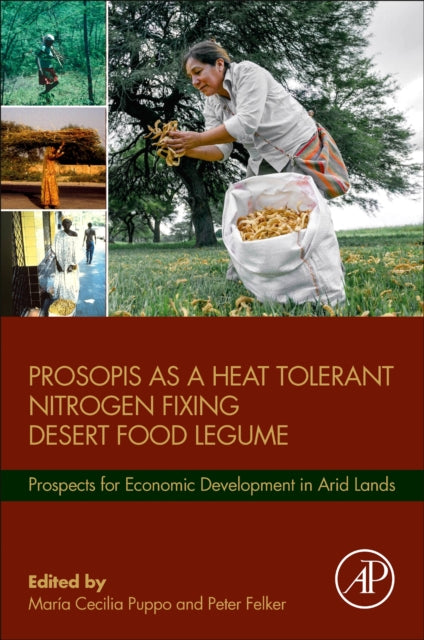Shulph Ink
Prosopis as a Heat Tolerant Nitrogen Fixing Desert Food Legume: Prospects for Economic Development in Arid Lands
Prosopis as a Heat Tolerant Nitrogen Fixing Desert Food Legume: Prospects for Economic Development in Arid Lands
YOU SAVE £10.62
- Condition: Brand new
- UK Delivery times: Usually arrives within 2 - 3 working days
- UK Shipping: Fee starts at £2.39. Subject to product weight & dimension
Bulk ordering. Want 15 or more copies? Get a personalised quote and bigger discounts. Learn more about bulk orders.
Couldn't load pickup availability
- More about Prosopis as a Heat Tolerant Nitrogen Fixing Desert Food Legume: Prospects for Economic Development in Arid Lands
Prosopis is a vital book for researchers interested in forestry, plant science, environmental science, and functional foods, as it discusses the historical importance of these trees as a human food source and reviews the contemporary food science of the fruit derived from them. It also explores the native genetic resources of Prosopis on four continents and classical genetic and horticultural techniques to stabilize the environment and alleviate human suffering in impoverished agro-ecosystems.
Format: Paperback / softback
Length: 374 pages
Publication date: 09 December 2021
Publisher: Elsevier Science Publishing Co Inc
The legume family (Fabaceae) is a diverse and important group of plants that play a crucial role in human and animal nutrition. With numerous genera and species, these plants are known for their ability to fix nitrogen, which is essential for plant growth and productivity. One notable member of the legume family is Prosopis, a shrub that has enormous historical importance as a human food source. In this treatise, we will explore the contemporary food science of Prosopis fruit, its nutritional value, and its potential applications in various industries.
Prosopis trees have been used for centuries as a primary source of food for many communities around the world. The fruit is rich in nutrients, including protein, carbohydrates, vitamins, and minerals. It is also a good source of fiber, which aids in digestion and promotes healthy bowel movements. Studies have shown that Prosopis fruit can help reduce the risk of chronic diseases such as diabetes, heart disease, and cancer.
In recent years, there has been increasing interest in the nutritional and functional properties of Prosopis fruit. Researchers have studied its antioxidant properties, which can help protect cells from damage caused by free radicals. Additionally, the fruit has been shown to have anti-inflammatory effects, which can help reduce the risk of chronic diseases such as arthritis and asthma.
The legume family (Fabaceae) is a diverse group of plants that includes many other species that are also important as food sources. For example, chickpeas, lentils, and beans are all members of the Fabaceae family and are widely consumed as legumes. These plants are also known for their nitrogen-fixing properties, which help improve soil fertility and reduce the need for chemical fertilizers.
In addition to their nutritional value, legumes are also important for their environmental benefits. They can help reduce soil erosion, improve soil quality, and promote biodiversity. Legumes also have the ability to sequester carbon dioxide from the atmosphere, which can help mitigate the effects of climate change.
The native genetic resources of the legume family are distributed across four continents, including Africa, Asia, Australia, and North and South America. Each continent has its own unique collection of species and varieties that have evolved over thousands of years to adapt to different environmental conditions. These genetic resources provide a valuable source of genetic diversity that can be used to develop new varieties of legumes that are more resistant to pests, diseases, and drought.
Classical genetic and horticultural techniques can also be used to stabilize the environment and alleviate human suffering in some of the world's most destitute agro-ecosystems. For example, crop rotation, intercropping, and the use of cover crops can help improve soil fertility, reduce soil erosion, and promote biodiversity. These techniques can also help reduce the use of chemical fertilizers and pesticides, which can have negative impacts on the environment and human health.
In conclusion, the legume family (Fabaceae) is a diverse and important group of plants that plays a crucial role in human and animal nutrition. Prosopis, in particular, has enormous historical importance as a human food source and has the potential to be used in various industries, including food, medicine, and agriculture. The native genetic resources of the legume family provide a valuable source of genetic diversity that can be used to develop new varieties of legumes that are more resistant to pests, diseases, and drought. Classical genetic and horticultural techniques can also be used to stabilize the environment and alleviate human suffering in some of the world's most destitute agro-ecosystems. This book is an essential read for researchers interested in forestry and plant science, environmental science, and functional foods.
Weight: 450g
Dimension: 229 x 152 (mm)
ISBN-13: 9780128233207
This item can be found in:
UK and International shipping information
UK and International shipping information
UK Delivery and returns information:
- Delivery within 2 - 3 days when ordering in the UK.
- Shipping fee for UK customers from £2.39. Fully tracked shipping service available.
- Returns policy: Return within 30 days of receipt for full refund.
International deliveries:
Shulph Ink now ships to Australia, Belgium, Canada, France, Germany, Ireland, Italy, India, Luxembourg Saudi Arabia, Singapore, Spain, Netherlands, New Zealand, United Arab Emirates, United States of America.
- Delivery times: within 5 - 10 days for international orders.
- Shipping fee: charges vary for overseas orders. Only tracked services are available for most international orders. Some countries have untracked shipping options.
- Customs charges: If ordering to addresses outside the United Kingdom, you may or may not incur additional customs and duties fees during local delivery.


